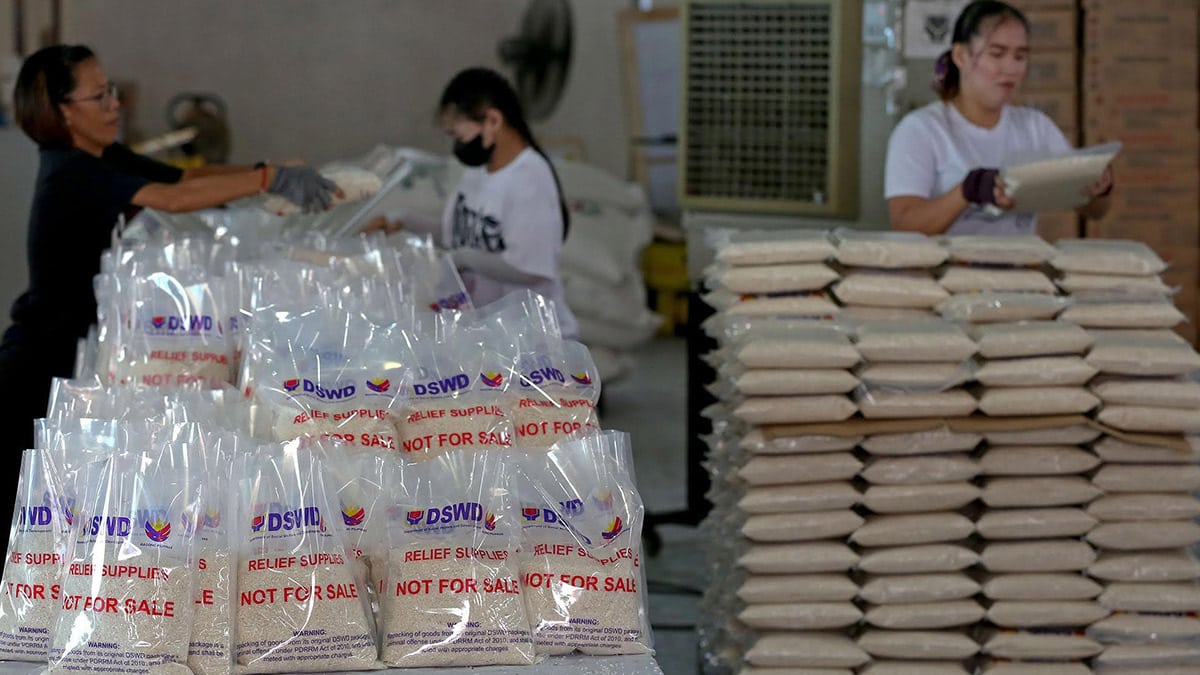
RELIEF PACKS COMING Government employees and volunteers work double time to repack rice and other food supplies at the Department of Social Welfare and Development warehouse in Pasay City so these can be delivered to areas devastated by successive typhoons this month. —Richard A. Reyes
MANILA, Philippines — The National Disaster Risk Reduction and Management Council (NDRRMC) on Monday said the three tropical cyclones that hit the country in rapid succession over the past week had displaced more than 600,000 people and damaged almost half a billion pesos worth of infrastructure and agriculture.
The NDRRMC reported that 685,071 people in northern and Central Luzon fled their homes and sought temporary shelters due to Tropical Cyclones Nika (international name: Toraji), Ofel (Usagi), and Pepito (Man-yi). Of these, 446,177 people went to evacuation centers, and 238,894 others stayed elsewhere.
READ: Pepito aftermath: Catanduanes calls for help amid devastation
The NDRRMC also said that the typhoons resulted in P469.8 million in damage to infrastructure and P8.6 million in damage to agriculture.
The combined effects of Nika, Ofel, and Pepito caused serious damage in Central Luzon, Cordillera, and Cagayan Valley regions. Eleven cities and municipalities were placed under a state of calamity—eight from Cagayan Valley, two from Cordillera, and one from Central Luzon. So far, P49.1 million worth of assistance has been provided to affected families, the NDRRMC said.
Pepito weakened into a severe tropical storm on Monday after it passed over the Luzon landmass.
Based on the 5 p.m. bulletin of the Philippine Atmospheric, Geophysical and Astronomical Services Administration, the center of the storm was located 405 kilometers west-northwest of Sinait, Ilocos Sur, with Pepito moving west-northwestward at a speed of 20 km per hour. By Wednesday, the weather bureau forecasts that Pepito might weaken into a remnant low.
Although the Office of Civil Defense said there were no casualties from Pepito, the Municipal Disaster Risk Reduction and Management Office in Ambaguio, Nueva Vizcaya, reported on Monday that seven people were killed after a landslide struck their house at the height of the typhoon. It said the victims were assisting in preemptive evacuation efforts to relocate residents to safer areas.
Continuing burden
Recovery efforts were underway to restore roads, bridges, and power in affected areas. However, persistent flooding remained a challenge for many residents.
Roberto Romero, 65, waded through floodwaters on Monday as he fled his inundated home at Guinatan village in the city of Ilagan, Isabela, disheartened by yet another calamity.
“This is a continuing burden for us. We have no money left,” Romero lamented as he and his neighbors endured the fifth flood to hit his village in just six weeks.
Electricity remained cut off in parts of Isabela, Cagayan, and Nueva Vizcaya, compounding the hardships faced by affected communities.
In Mountain Province, the local electric cooperative reported damage to its facilities, leaving 90 percent of its coverage areas without electricity, according to the Mountain Province Electric Cooperative Inc.
The widespread outages were due to fallen trees that hit power lines and poles across the region.
DELUGE Floodwaters continue to swamp communities in the City of Ilagan and in the nearby towns of Gamu and Quirino in Isabela on Monday, a day after Supertyphoon “Pepito” (international name: Man-Yi) crossed northern Luzon. This marks the fourth major flooding event to hit Isabela and Cagayan provinces in just a month. —VILLAMOR VISAYA JR.
In Bulacan, the Sierra Madre mountain range once again proved its role in shielding the province from the full force of Pepito, local officials said.
Manuel Lukban Jr., chief of the Bulacan Provincial Disaster Risk Reduction and Management Office, said this natural barrier significantly weakened the typhoon’s impact on the province, sparing it from severe damage.
“The sudden upward movement of the typhoon’s eye caused it to hit the Sierra Madre mountains, greatly reducing the intensity of rain and wind across Bulacan,” Lukban said.
Remember survivors
President Marcos called on Filipinos to remember typhoon survivors as he vowed that the government would lead the rehabilitation of ravaged communities.
“Hopefully, when Christmastime comes, we Filipinos can remember our countrymen who were affected by calamities,” he said on the sidelines of the 49th National Prayer Breakfast in Malacañang on Monday. “And perhaps, instead of spending on gifts, we could share what we have with them [as] they are suffering and in need.”
The American government is sending $1 million in humanitarian aid for typhoon survivors, US Defense Secretary Lloyd Austin III announced during a visit to Malacañang on Monday.
Austin said the US aid is meant to augment the supplies that the United States delivered to the Philippines in early October for Supertyphoon Julian (Krathon), which slammed the northern islands and brought heavy rainfall, strong winds and rough seas mainly in the Batanes and Babuyan Islands. —with reports from Frances Mangosing, Gillian Villanueva, Villamor Visaya Jr., Joanna Rose Aglibot, Tonette T. Orejas, Michael B. Jaucian, and Melvin Gascon